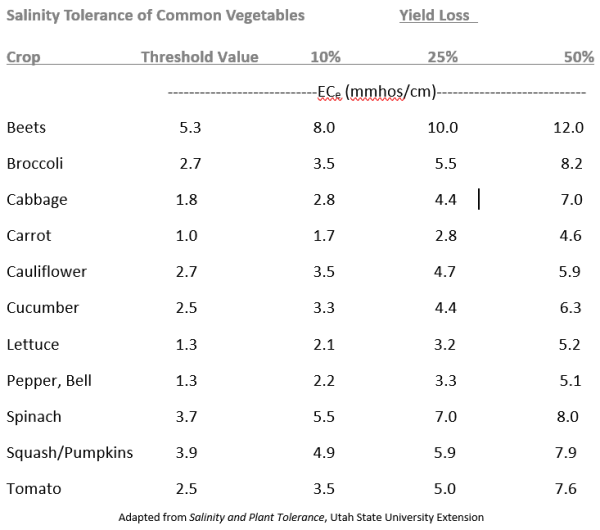

To send a message to an author, click on the author's name at the end of the article.
This Month in Ag Connection | Ag Connection - Other Issues Online
Soil testing provides valuable insights into pH and the levels of nutrients, guiding fertilizer application as well as recommendations of materials to adjust soil pH, such as lime or sulfur. Soil testing in a high value production space, such as a high tunnel, is even more critical to ensure revenues cover construction and maintenance costs.
Most growers are familiar with testing soil for macronutrients (nitrogen, phosphorous, potassium, calcium and magnesium) and pH, but might be less familiar with testing for soluble salts. Soluble salts are measured by electrical conductivity testing and reported in units of mmhos/cm. High levels of soluble salts in soil can reduce yields and damage crops. Sodium is not the only soluble salt that can cause yield loss, excess fertilizer salts such as magnesium, calcium, and potassium can also contribute to this problem. Plant nutrients should always be applied based on soil test recommendations. Excess nutrients (organic or synthetic) applied in dry forms or through fertigation, shallow irrigation, and high levels of salts in irrigation water, can all over time raise soluble salt levels in the soil to damaging levels.
Soils with high levels of soluble salts are categorized in a range from very slightly saline, to very strongly saline, depending on the concentration of soluble salts in a tested volume of soil. As soluble salts accumulate to high levels in the rootzone, plants have a much harder time withdrawing water from the surrounding soil. Certain crops are more sensitive to high salt levels than others. For example, beets can thrive in moderately saline soils, while other crops such as tomatoes and peppers might suffer yield losses of 25% or greater in similar soils. In field production systems in Missouri, salt accumulation in soils is generally not a concern, due to high levels of precipitation from rainfall and snow that leach soluble salts downward out of the rootzone.
However, in high tunnel production systems rainfall is completely excluded, and accumulation of high levels of soluble salts in the rootzone is much more common. Higher rates of fertilizer are often applied to high tunnel soils to maximize crop yields, additionally, drip irrigation does not supply enough water to leach salts downward into the soil profile. In a high tunnel, as water evaporates and moves upward in the soil profile, salts can accumulate to damaging levels in shallow layers of the soil. In a survey of high tunnel growers in Pennsylvania (Penn State), soils in conventional high tunnels on average had strongly saline soils, while soils in organic high tunnels on average had moderately saline soils. Whether organic or conventional, salt levels in high tunnel soils were shown to be capable of reducing yields of non-salt tolerant crops.
There are multiple options high tunnel growers can use to manage this problem. One option would be to move the high tunnel to a new location with fresh soil, the added benefit of this practice is to reduce soil-borne disease issues that tend to accumulate in high tunnels. This practice however might not be feasible, as most growers treat high tunnels as fixed stationary structures. The second option is to remove the plastic from a high tunnel after crop harvest in the fall and leave the high tunnel open until the following spring. Annual or semi-annual removal of plastic has proven successful for some growers, who are able to maintain soluble salts below damaging levels in their high tunnels. This process involves a high amount of labor and might not be possible for growers who use their high tunnels for winter production of crops such as spinach and greens. Using high amounts of irrigation in high tunnels can also leach soluble salts out of the rootzone. General guidance for this practice is to apply six inches of water to leach 50% of salts from the rootzone, 12 inches to leach 80%, and 24 inches to leach 90%. Leaching can be accomplished with drip irrigation or sprinklers.
The only way to know whether soil has high levels of soluble salts is to test. It is recommended to collect a dozen subsamples taken throughout the tunnel, to a depth of 6 inches. If growing on fixed beds, it is recommended to sample only from the beds and not from the alleys or walk-ways. Thoroughly mix the subsamples together and drop off two cups at the local MU Extension office or send samples directly to the MU Extension Soil Testing Laboratory. University of Missouri Extension Soil Testing Lab offers soluble salt testing (as measured by electrical conductivity) for $6. Make sure to request an electrical conductivity test, or E.C. test, when submitting the sample. Salinity tolerances and potential yield losses of common vegetables are listed in the table below. Tomato yield losses of 10% can occur at electrical conductivity values as low as 3.5 mmhos/com, and 50% at values of 7.6 mmhos/cm. See the table below for soluble salts levels capable of reducing yield in other commonly grown high tunnel crops. If the soil test indicates high levels of soluble salts and a grower chooses to take action to address this problem, it is important to retest the soil to ensure the practice was successful in lowering soluble salts to desired levels.

Soil samples may be sent directly to the laboratory at the address below, be sure to include a check made payable to "MU Soil Testing" as well as a soil sample form. Sample forms can be obtained at your local MU Extension office or online at: https://extension.missouri.edu/mp727.
MU Soil and Plant Testing Laboratory
1100 University Avenue
Mumford Hall Room 23
Columbia, MO 65211
Source: Justin Keay, Horticulture Specialist
This Month in Ag Connection | Ag Connection - Other Issues Online
Farmers begin to think about income taxes this time of year. This year was unique with the drought, high fertilizer and chemical prices and variation in soybean yields. Corn yields and prices have been positive.
Thursday, December 1 - 12:30 to 2:45 pm
Boone County Extension Center (Columbia)
Putnam County Library (Unionville)
Schuyler County Assembly Room (Lancaster)
Tuesday, December 6 - 6:15 to 8:30 pm
Audrain County Courthouse Basement (Mexico)
Mercer County Extension Center (Princeton)
Pre-registration is required. To register call your local ag business specialist or online at muext.us/abpevents. Contact an MU Extension Ag Business specialist or a tax professional for specific tax questions.
Source: Joe Koenen, Ag Business & Community Specialist
This Month in Ag Connection | Ag Connection - Other Issues Online
Houseplants
Ornamentals
Miscellaneous
Source: Missouri Botanical Garden
This Month in Ag Connection | Ag Connection - Other Issues Online

Some of you may not know but after a 43-year career, I am retiring. I want to thank all of you that read this newsletter, my weekly column (which I will continue), as well as publications and articles I have written over the years. I appreciate all the people whose lives I have touched in that time, my co-workers especially. Some final thoughts for this newsletter:
It has been a pleasure serving Missouri citizens for all these years and look forward to seeing or hearing from you in the future.
Source: Joe Koenen, Ag Business & Community Specialist

Publishing Information
Ag Connection is published monthly for Northeast and Central areas of Missouri producers and is supported by the University of Missouri Extension, the Missouri Agricultural Experiment Station, and the MU College of Agriculture, Food and Natural Resources. Managing Editor: Mary Sobba.